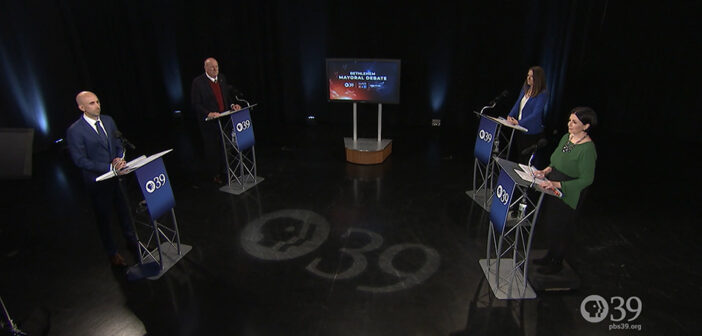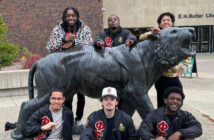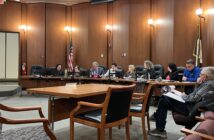Bethlehem mayoral candidates John Kachmar (R) and J. William Reynolds (D) debated on Oct. 28 leading up to the Nov. 2 municipal election.
Bethlehem will have a new mayor for the first time in eight years as the incumbent Mayor Robert Donchez reaches his term limit.
Reynolds has been on Bethlehem’s city council since 2008 and is a high school history teacher. Kachmar was born and raised in Bethlehem and has worked as a county administrator and city manager in several cities and counties across the U.S.
The candidates discussed various issues such as sustainability, the COVID-19 pandemic, housing, representation, police funding and Lehigh’s expansion.
During discussions about the city budget and how to spend the COVID-19 relief funding, Kachmar said the administration can only spend some of that money on past costs before having to focus on current and future COVID-19 related expenses.
The current administration wanted to use the funding to patch pre-existing holes in the budget, which Kachmar said may cause problems when it comes to the Code of Federal Regulations (CRF) and the included stipulations for how the money can actually be spent.
Reynolds said he believes there needs to be more light shed on the systemic issues the pandemic has brought up within America and wants to work with people in the community of Bethlehem. He said the funds should be spent to cover the short-term costs of the pandemic imposed on the city’s most vulnerable populations, in balance with spending on long-term responsibilities.
“We need to listen, we need to talk to the people that are in our community,” Reynolds said. “It is not just about what people want to do in city hall.”
Kachmar agreed with Reynolds but said there needs to be a creative direction in which money is used within Bethlehem.
“You have to take a look at something that you can do right away that has an almost instantaneous effect,” Kachmar said.
He said a portion of funds should be concentrated on helping those who are homeless. He said it is within the realm of the funding to buy a motel and convert it to a homeless shelter to prevent the spread of COVID-19.
He said the city has to address the causes of homelessness.
When asked about Hispanic representation in the mayor’s cabinet or among department heads, Reynolds said he plans to make one of his two employees in the mayor’s office a director of equity and inclusion.
Reynolds said this bilingual employee will not only oversee the spending of pandemic-related dollars, but the community as well.
Reynolds also noted the gaps and exclusions between communities.
The moderator said Bethlehem is 30 percent Hispanic and Reynolds said 20 percent of Bethlehem residents speak Spanish as their first language. He said this is not represented in city hall or its services.
“It starts with how do we reach populations that we have never been good at reaching before and that’s been a failure of city hall,” Reynold said.“We need a city hall that is going to reflect what our community looks like.”
When asked the same question, Kachmar said there are better services for the community within non-Hispanic areas of Bethlehem. He said Hispanic members of the community are treated as “second class service citizens.”
In the discussion of Lehigh University’s growth, Reynolds was asked if the university should have a larger role in the city investments.
“Lehigh students, Lehigh professors, Lehigh’s staff are a great anchor institution for the city of Bethlehem, but at the same time, as with everything else, there are things within the best interest of an institution that’s not in the best interest of the public,” Reynolds said.
Kachmar noted Lehigh’s positive economic impact on the area, but also acknowledged the costs the university imposes on Bethlehem.
“The city of Easton has a tax relationship with Lafayette,” Kachmar said. “I would sit down with Lehigh and say, ‘Guys we love you, want you in our city, but you need to ante up and pay some of the expenses of our police, our EMS, our fire department, our public health department.’”
The next topic discussed was reviewing the police budget and the department’s organization, given that the police department’s budget is the largest in the city—$12 million dollars this year on salaries alone, the debate moderator said.
Kachmar was the first to respond.
“I’d make sure the council understood in this form of government, that they can tell me — who supervises the police department — what services they want,” Kachmar said. “But they should not be telling the police what services they want. That form of communication is not good. It’s called separation of powers and it’s important to pay attention too.”
In response, Reynolds stressed the importance of making police officers’ jobs easier, specifically through expanding mental health services offered to them.
When asked about how vulnerable residents will be protected from climate change, Reynolds responded explaining his work in city council regarding the climate crisis.
He said the city’s Climate Action Plan highlighted racial and environmental justice. He said 40 percent of all dollars invested in the Climate Action Plan would go to the most vulnerable communities.
Kachmar was asked how he would protect residents from the impacts of climate change.
Kachmar said he would use functional solutions, and address the main problem of the issue — Bethlehem’s air quality, specifically emissions.
“What I would do is put ITS (intelligent transportation system) systems into the city, or intelligent traffic systems into the city,” Kachmar said. “Keep the traffic moving. Keep the emissions down as low as you possibly can.”
As the debate came to a close, the candidates delivered their closing statements. Kachmar was the first to close.
Kachmar said he has a track record in local government and knows the difference between “BS and real costs of operation.”
“I do not believe that more — meaning money, staff, equipment — is better,” he said. “I do know that you can change embedded spending in tax cultures in a city government and turn that culture into a performance based organization that focuses on public service, with the city of Bethlehem resident as the satisfied customer.”
Reynolds said there is an incredible opportunity as we exit the pandemic.
“Bethlehem has always been the place that people want to live and that has never been more true than it has been right now,” he said. “And that formula has gotten us to this place right here — economic revitalization, investing in our neighborhoods — creating the type of city that people want to be a part of.”






Comment policy
Comments posted to The Brown and White website are reviewed by a moderator before being approved. Incendiary speech or harassing language, including comments targeted at individuals, may be deemed unacceptable and not published. Spam and other soliciting will also be declined.
The Brown and White also reserves the right to not publish entirely anonymous comments.
1 Comment
Kachmar is the adult at this party with the background to run our city. Reynolds is a career politician who is a prolific orator; but is a school teacher not ready for the big stage of running an $80 million operation.
A vote for Kachmar insures that Bethlehem has a check & balanced government since City Council are all Reynolds Democrat rubber stamp puppets. Kachmar will have a bipartisan administration & represent the balance needed to offset a socialist City Council.